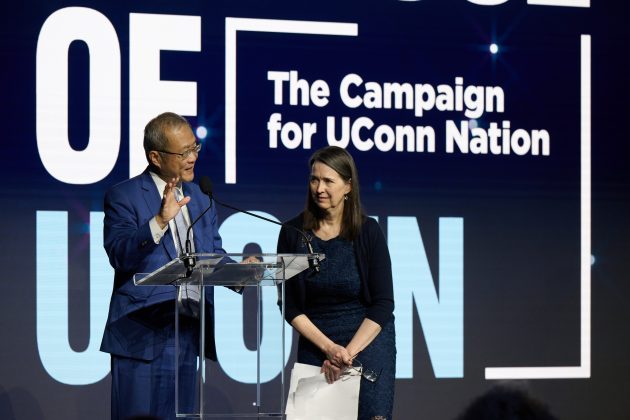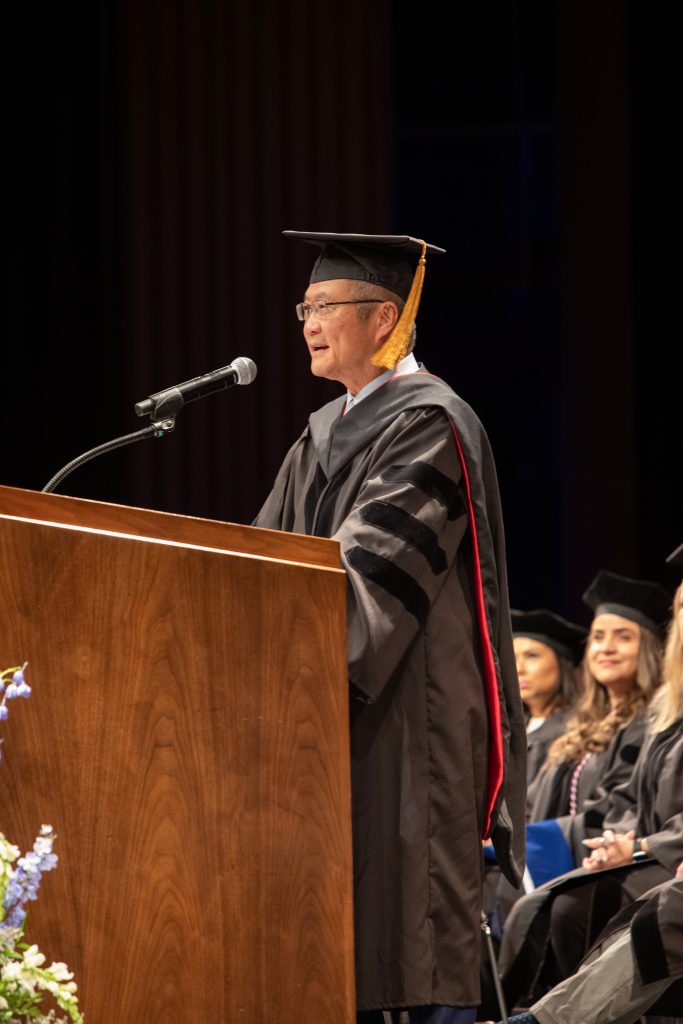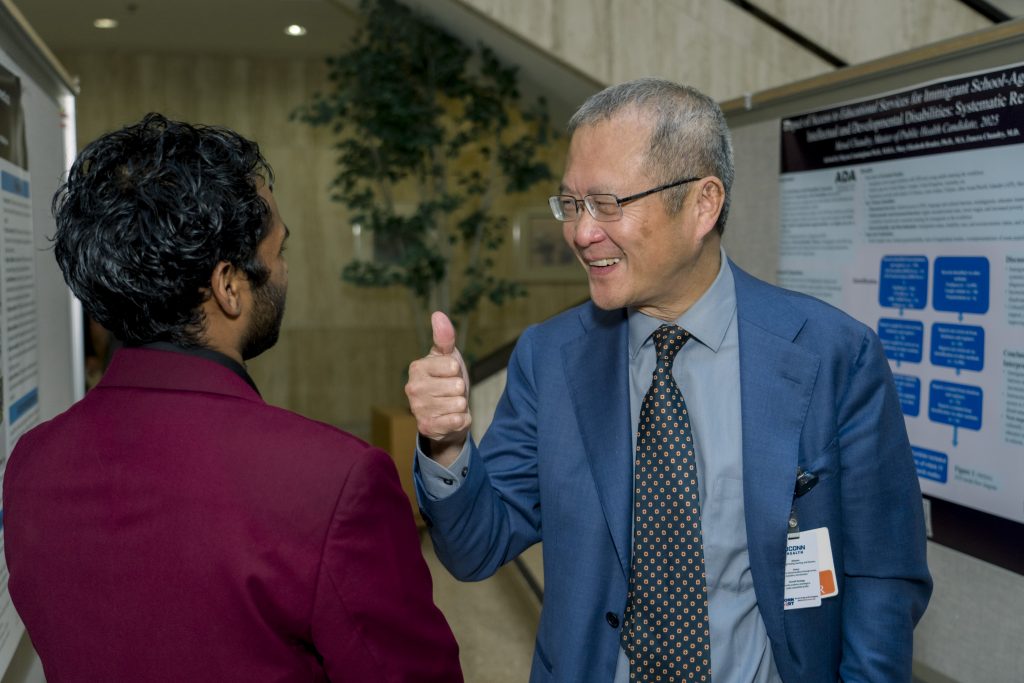Dr. Bruce T. Liang Reappointed Dean of UConn School of Medicine
The University of Connecticut has reappointed Dr. Bruce T. Liang to a third five-year term as dean of its UConn School of Medicine, effective July 1, 2025.
Liang has served in this UConn leadership role since 2015, in addition to serving UConn Health and his heart patients as a cardiovascular physician-scientist at the Pat and Jim Calhoun Cardiology Center of UConn Health.

“His continued leadership reflects the strong foundation he has built and the significant progress achieved over the past decade,” shared UConn Provost and Executive Vice President for Academic Affairs Anne D’Alleva in her announcement.
Liang is applauded for leading the School of Medicine through a period of meaningful growth and advancement. During his last five-year term alone, he oversaw the full implementation of the MDelta curriculum, which has enriched the educational experience for students and improved outcomes. The School has also expanded its class size, exceeding the initial targets set by Bioscience Connecticut, a state investment launched in 2011 to position Connecticut as a leader in biomedical research and innovation. In addition, Liang led the development of a Science Strategy Plan aligned with the University’s priorities, recruited exceptional faculty, and helped drive an increase in NIH funding. In fact, under Liang’s leadership the medical school has received record-breaking research grant funding of over $100 million year after year. Plus, collaborative partnerships with Jackson Laboratories and Connecticut Children’s have deepened, further elevating the School’s research profile.
UConn’s medical school proudly remains the top contributor to Connecticut’s health care workforce, with many graduates staying in the state to practice. Its Graduate Medical Education programs have robustly grown and now rank in the top 10% nationally. The School is also a significant producer of many new scientists and public health experts.

Liang has also strengthened community service programs, securing major grants, supporting the Urban Service Track, Area Health Education Center, Health Career Opportunity Programs, and Office of Multicultural and Community Affairs, as well as expanding care access through clinics serving immigrants in the state.
During his past term as dean, Liang also served as Interim CEO of UConn Health, for more than two years, guiding the institution through a key leadership transition with professionalism, growth, integrity, and a clear commitment to the university’s mission.
“Please join me in congratulating Dr. Liang on his reappointment and thanking him for his continued service to UConn Health and the University of Connecticut,” said D’Alleva.
“Thank you to the Provost, the University of Connecticut, and UConn Health for once again entrusting me to take our amazing medical school and its people, along with their innovative medicine, medical education, and research to even greater pinnacles,” said Liang. “It makes me so proud to be reappointed to serve as your dean for a third time— and to be a UConn Husky.”
Liang is an internationally recognized cardiologist and researcher and national leader in academic medicine. He has been consistently named one of America’s Top Doctors and Best Doctors in America for cardiovascular disease care. His cutting-edge translational research contributions have advanced scientific knowledge about heart disease. His latest research investigations have developed a new potential medication for advanced heart failure patients. His research has been continuously funded since 1986 by the NIH, the American Heart Association, and the U.S. Department of Defense.

In addition to serving as the longtime dean of UConn School of Medicine, he is the Ray Neag Distinguished Professor of Cardiovascular Biology and Medicine. Before joining the UConn Health faculty in 2002, for 13 years he served the University of Pennsylvania School of Medicine as associate professor of medicine and pharmacology. Liang received his bachelor’s degree from Harvard in biochemistry and molecular biology and his medical degree from Harvard Medical College. He completed his internal medicine internship and residency training at the Hospital of the University of Pennsylvania and cardiology fellowship training at Brigham and Women’s Hospital and Harvard Medical School.
He is a fellow of the American Association for the Advancement of Science (AAAS), American College of Cardiology, and the American Heart Association, and is an elected member of the American Society for Clinical Investigation, the Association of University Cardiologists, the Council on Clinical Cardiology and Basic Cardiovascular Sciences, and the Connecticut Academy of Science and Engineering.
Latest UConn Today
- UConn School of Nursing Welcomes Class of 2029Meet two first-generation students who have a passion for nursing
- Three Faculty Members Named Board of Trustees Distinguished ProfessorsThe University of Connecticut is proud to announce the selection of three exemplary faculty members as this year's Board of Trustees Distinguished Professors. This prestigious award represents the highest honor the University can confer upon its faculty, celebrating their outstanding contributions in research, teaching, and public engagement
- Science in Seconds: Eating Away at DiseaseUConn Health researchers are studying how phagocytes feel, taste, digest and respond to eating and clearing away debris or foreign particles inside the body
- Making Electronic Devices Faster, More Powerful, and Better at Staying CoolIn a paper published as an Editor's Pick in Applied Physics Letters, College of Engineering's Georges Pavlidis outlines ways to manage heat in high-speed electronics
- UConn Health Recognized for Responsible Antibiotic UseJohn Dempsey Hospital an ‘Antimicrobial Stewardship Center of Excellence’
- UConn Adopts New Budget with Strategic Adjustments to Address Funding Shortfalls'In this and everything we do, we will ask ourselves: Is this helping our graduation rate? Is this supporting student success?'













